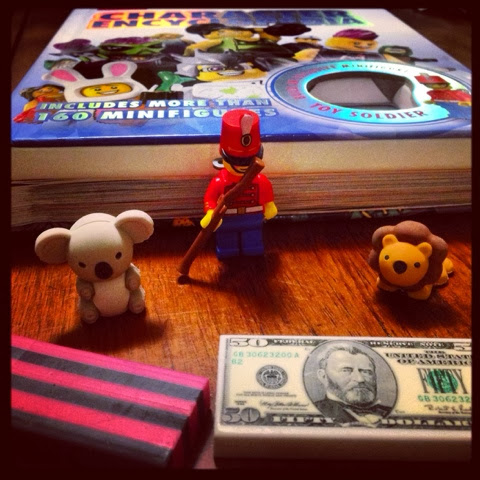I scan the tables where kids are painting swirls of pink, white and red, looking for his dirty-blonde head and colorful plaid shirt (which he's actually not wearing). He's not there—nor is he on the floor playing cards. Then I see him, huddled, head-down, with four little buddies. They whisper as I approach, and he quietly gets up, tucking a big book under his arm. He walks over and pushes the tome toward me.
"Look what I got."
He pauses, looking proud and slightly tentative.
"It was 19 dollars."
It is Lego Minifigures: Character Encyclopedia. Which is, essentially, a glorified 203-page hardcover catalogue. Which, apparently, purchased on Amazon, costs $10.55.

"Wow,"
I say.
"So that's what you decided to get?"
After much discussion about the school book fair, Jon and I had somehow come to the decision that we would let him spend the $20 he had saved on whatever books he wanted. Initially, I'd preferred that one of us supervise his purchases at the fair on Thursday night—but we talked it through and decided that we'd go ahead and let him take his money and make the buy during his class "field trip" to the fair (a class activity that I think is crazy) today. The deal was this: First, Jules had to do some comparison shopping with me online last night. He agreed to this happily and we took the list of 8 books (6 of them came with toys) that he'd made when he'd visited the fair with his class the day before (!!!). We looked at them one by one—evaluating the pros and cons of each, and he actually crossed off 6 books, leaving only the two most expensive choices: both came with toys; one was the book he actually purchased.
"Yes!!!"
He is so excited he's shouting (louder than normal).
"I wasted all of my money on this one book!"
Not quite grasping the nuances of similar words is one of my favorite traits of five-year-olds. Clearly he meant that he "spent" all of his money on his choice, and I quickly explain the difference. Which he appreciates.
"Oh, yes, spent!"
He laughs heartily at his mistake as if we're old friends. He's in a spectacular mood. Even more so when he pulls out his backpack to show me the other prizes he "got" (read: bought)—erasers in various shapes—after finding another $1.25 in his wallet. Ironically, one is in the form of a miniature $50 bill.
Our evening centers solidly around his purchase: while I make black-bean quesadillas and cut strawberries, he assembles the toy soldier that came with the guide and lets Kai play with the koala and lion prizes (which might be erasers or might not, I realize upon closer inspection). After a shower, he flips through the pages, "reading" about the characters to Kai. He requests that we read this story—which is not at all a story—before bed. Kai's into it too. And so we do: covering ho-hum characters like Cheerleader girl and Skater boy but also discovering Tribal Hunter, an intriguing shy-guy who apparently has a talent for finding lost objects and an obsession with dancing when nobody's looking. As the "story" goes, he's got mad moves. This guy, I'd like to meet.
When it's time for bed, Jules carefully places his new bible on the shelf next to his scrolling animal nightlight and crawls under his covers, patting down a place for me. The moment I lay down my head next to his, he asks earnestly, in a whisper:
"Do you think my book was a good choice?"
I deflect the question:
"Do you?"
"Yes,"
he says confidently.
"Me too,"
I whisper back. And I'm not even totally lying.
